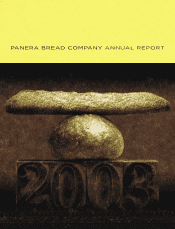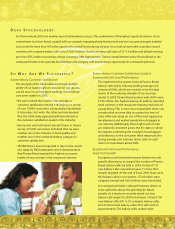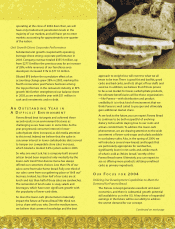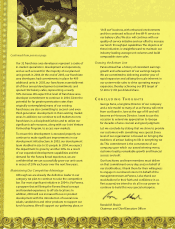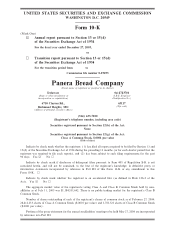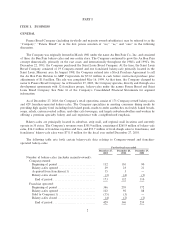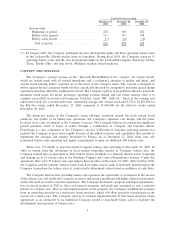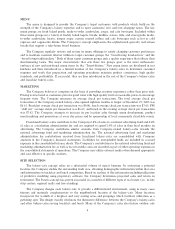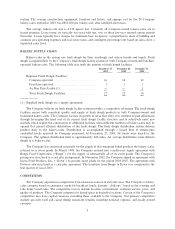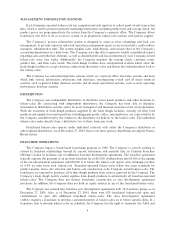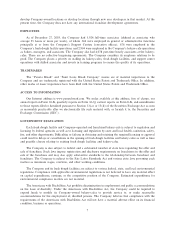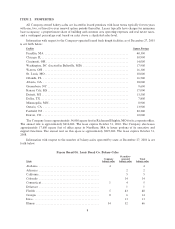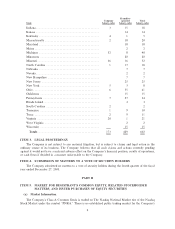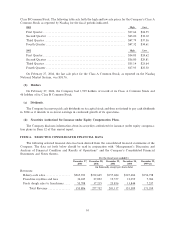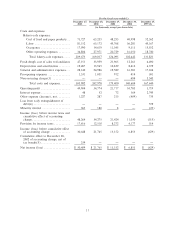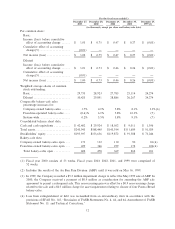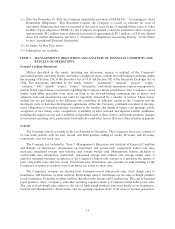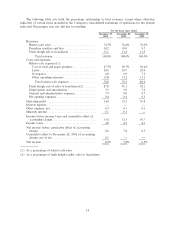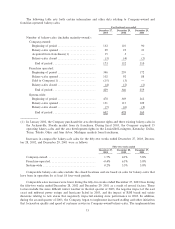Panera Bread 2003 Annual Report Download - page 10
Download and view the complete annual report
Please find page 10 of the 2003 Panera Bread annual report below. You can navigate through the pages in the report by either clicking on the pages listed below, or by using the keyword search tool below to find specific information within the annual report.MANAGEMENT INFORMATION SYSTEMS
Each Company-operated bakery-cafe has computerized cash registers to collect point-of-sale transaction
data, which is used to generate pertinent marketing information, including product mix and average check. All
product prices are programmed into the system from the Company's corporate oÇce. The Company allows
franchisees who elect to do so access to certain of its proprietary bakery-cafe systems and systems support.
The Company's in-store information system is designed to assist in labor scheduling and food cost
management, to provide corporate and retail operations management quick access to retail data, and to reduce
managers' administrative time. The system supplies sales, bank deposit, and variance data to the Company's
accounting department on a daily basis. The Company uses this data to generate weekly consolidated reports
regarding sales and other key elements, as well as detailed proÑt and loss statements for each Company-owned
bakery-cafe every four weeks. Additionally, the Company monitors the average check, customer count,
product mix, and other sales trends. The fresh dough facilities have computerized systems which allow the
fresh dough facilities to accept electronic orders from the bakery-cafes and deliver the ordered product back to
the bakery-cafes.
The Company has network/integration systems which are corporate oÇce electronic systems and tools
which link various information subsystems and databases, encompassing e-mail and all major Ñnancial
systems, such as general ledger database systems and all major operational systems, such as store operating
performance database systems.
DISTRIBUTION
The Company uses independent distributors to distribute sweet goods products and other materials to
bakery-cafes. By contracting with independent distributors, the Company has been able to eliminate
investment in distribution systems and to focus its managerial and Ñnancial resources on its retail operations.
With the exception of fresh dough products supplied by the fresh dough facilities, virtually all other food
products and supplies for retail operations, including paper goods, coÅee, and smallwares, are contracted for by
the Company and delivered by the vendors to the distributor for delivery to the bakery-cafes. The individual
bakery-cafes order directly from a distributor two to three times per week.
Franchised bakery-cafes operate under individual contracts with either the Company's distributor or
other regional distributors. As of December 27, 2003, there were three primary distributors serving the Panera
Bread system.
FRANCHISE OPERATIONS
The Company began a broad-based franchising program in 1996. The Company is actively seeking to
extend its franchise relationships beyond its current franchisees and annually Ñles an Uniform Franchise
OÅering Circular to facilitate sale of additional franchise development agreements. The franchise agreement
typically requires the payment of an up-front franchise fee of $35,000 (broken down into $5,000 at the signing
of the area development agreement and $30,000 at or before the bakery-cafe opens) and continuing royalties
of 4-5% on sales from each bakery-cafe. Franchise-operated bakery-cafes follow the same standards for
product quality, menu, site selection and bakery-cafe construction as do Company-owned bakery-cafes. The
franchisees are required to purchase all of their dough products from sources approved by the Company. The
Company's fresh dough facility system supplies fresh dough products to substantially all franchise-operated
bakery-cafes. The Company does not Ñnance franchisee construction or area development agreement
purchases. In addition, the Company does not hold an equity interest in any of the franchised bakery-cafes.
The Company has entered into franchise area development agreements with 32 franchisee groups as of
December 27, 2003. Also, as of December 27, 2003, there were 429 franchised bakery-cafes open and
commitments to open 409 additional franchised bakery-cafes. The Area Development Agreement
(ADA) requires a franchisee to develop a speciÑed number of bakery-cafes on or before speciÑc dates. If a
franchisee fails to develop bakery-cafes on schedule, the Company has the right to terminate the ADA and
6

